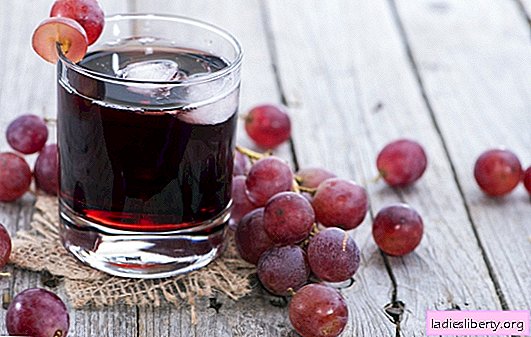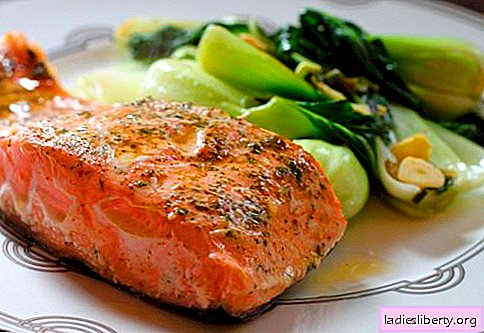
Grape leaves were discovered in fossils dating back to prehistoric times. The grapes were domesticated until 5000 BC in the area that is now called the Middle East, it is mentioned in biblical writings, and is also depicted on the walls in tombs that date back to 2400 BC.
These facts loudly declare that grapes themselves, as well as products from it, including juice, are extremely valuable to humans and are an integral part of history. So what determines this value?
Description and receipt of grape juice
Before you start touting grape juice, you should clarify what it is and where it comes from. Grape juice is usually a clear liquid of a light yellow or pinkish-red hue, while in volume it gains a saturated color. Juice is prepared by pressing from ripe grapes. Any variety is suitable, preferably the amount of sugar in the berries is from 15 to 20%.
Manufacturing technology at home is very simple. The grapes are washed, the stalks are removed, then the berries are squeezed using kitchen appliances (juicer, meat grinder), or crushed by hand. In large volumes use presses (see. "Taming of the Shrew"). Freshly squeezed juice is ready for use after separating the wort from the pulp. It is stored for a short time in the refrigerator. It can be preserved by pre-heat treatment (pasteurization) and hermetically closed in a sterile container.
In industrial conditions, the procedure is somewhat more complicated, the juice undergoes a finer purification, but in principle the manufacturing process is the same.
Useful qualities of grape juice
As already mentioned, people have long noticed the extraordinary benefits of grape juice at the dawn of civilization, and this did not require any laboratory tests. However, a modern person wants to know everything, especially when it comes to things that are familiar at first glance.
So, the composition of grape juice may vary somewhat, depending on which grape it was obtained from. But the approximate properties are as follows (per 100 g of juice):
• Water - 50-90 g;
• Carbohydrates 10-30 g (average 15-16 g);
• Protein - 0.15-1.0 g;
• Malic, tartaric and other acids - 0.5-1.7 g;
• Fiber - 0.3-0.6 g;
• Potassium - 250 mg;
• Calcium - 45 mg;
• Phosphorus - 25 mg;
• Magnesium - 17 mg;
• May contain a small amount of iron, cobalt and other minerals (chromium, potassium);
• Vitamins: C, B1, B2, P, PP, provitamin A and others in small quantities.
Grape juice is a rich and valuable product both medicinally and nutritionally. Nutrition is due to a large amount of sugar - up to 30%. Basically, these are easily digestible sugars - glucose, fructose. In the liver, sugar is processed into glycogen, accumulates as a reserve supply of carbohydrates, and is consumed during the work of the body.
Also grape juice contains antioxidants (polyphenols). They have anti-inflammatory, lipid-lowering and antioxidant properties, strengthen the immune system. One of them is rosveratrol (found mainly in the peel and seeds of grapes). Studies in rats have proven that rosveratrol can slow or prevent the growth of tumors in the lymph, liver, stomach, breast, colon, skin cancer and leukemia.
Another natural anti-inflammatory component is flavonoid quercetin. According to research, it can also help prevent or slow down cancer. There is also a theory that due to anti-inflammatory effects, quercetin can help reduce allergy symptoms, including a runny nose, tears, or a skin rash.
Also, rosveratrol and quercetin can reduce the risk of developing atherosclerosis and protect against damage caused by "bad" cholesterol. In general, polyphenols can reduce the risk of cardiovascular disease by lowering blood pressure and the risk of irregular heart rhythms.
In addition to the above, potassium and fiber found in grape juice also help maintain heart health. Increased potassium intake can help reduce the negative effects of too much sodium in the diet in people with high blood pressure.
Very useful grape juice for constipation. It is recommended to consume 200 ml of juice for half an hour before eating, in the morning and during the day. Natural grape juice helps to normalize stool, tone the intestinal muscles. With regular use, grape juice cleanses the body of toxins and toxins.
For older people, a noteworthy fact is that grape juice restores brain function and is able to suppress the development of Alzheimer's disease.
Other ingredients found in grape juice include tannins, inositol, choline, and pectin.
Grape Juice Treatment
The benefits of grape juice are so high that a separate area of treatment with this drink was highlighted - ampelotherapy (treatment with grapes or juice). To do this, use special, "healing" grape varieties. They treat nephritis, nephrosis, disorders of the nervous system, anemia, as well as the initial stages of tuberculosis. In humans, metabolic processes are activated, gastric secretion is normalized, appetite improves. The dose of drinking juice for medicinal purposes can reach 1.2 l / day. At the same time, alcohol, fatty foods, dairy and sour-milk products, as well as mineral water and kvass are excluded from the diet in order to avoid complications from the gastrointestinal tract. Ampelotherapy appeared in Russia in 1878, on the South Coast.
Grape juice was widely used in cosmetology, for the manufacture of face masks and skin. Juices and light grape varieties are mainly used, since dark ones contain a significant amount of coloring matter. Masks contribute to skin rejuvenation, enrich it, give turgor and tone to tissues.
When using grape juice for therapeutic purposes, it should be understood that it is rich in acids, and they are harmful to tooth enamel. Therefore, it is advisable to drink the juice through a straw, and then rinse your mouth.
Grape Juice in cooking
Man learned to use grape juice and as an ingredient for various dishes. For example, syrups, sauces and gravy. Also, based on grape juice, you can cook marinade for meat or some kind of dessert. Obviously, grape juice is versatile.
Contraindications and harm from grape juice
Due to the high acid content, juice should be discarded for people suffering from stomach ulcers, gastritis, duodenal ulcers, heart defects, kidney problems, gout, tuberculosis in advanced forms and exacerbations of chronic tuberculosis, secondary anemia and liver cirrhosis. Caution should be taken in pregnant women with grape juice.
Ampelotherapy is contraindicated in diabetes, obesity, hypertension and chronic diarrhea.
Without exaggeration, we can say that natural grape juice is one of the most useful products in the history of mankind. Known from antiquity, it has a powerful potential for healing, nourishing and enriching the human body with a wide variety of useful components.











